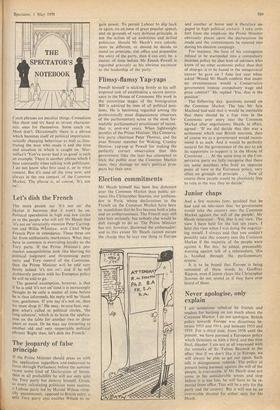Election commitments
Mr Heath himself has been less dishonest over the Common Market than public ser- vants like Christopher Soames, our ambassa- dor in Paris, whose declarations to the French on the Common Market have been so scandalous that he has become both a joke and an embarrassment. The French may still take him seriously, but nobody else would be daft enough to do so. The Prime Minister has not, however, disowned the ambassador; and to this extent Mr Heath cannot escape the charge that he says one thing to Europe and another at home and is therefore en- gaged in high political trickery. I take com- fort from the emphasis the Prime Minister obviously places upon the declarations he made and the commitments he entered into during his election campaign.
For instance, the base of his courageous refusal to be stampeded into a compulsory incomes policy by that host of advisers who know of no other economic policy than that of stop-go, is to be found in the unequivocal answer he gave on 1 June last year when asked 'Would Mr Heath confirm that under no circumstances would a Conservative government impose compulsory wage and price control?' He replied 'Yes, that is the position'.
The following day. questions turned on the Common Market. The late Mr lain Macleod had said that it would be inevitable that there should be a free vote• in the Commons over entry into the Common. Market after negotiations. Heath, in effect, agreed : 'If we did decide that this was a settlement which met British interests, then of course we as a government would recom- mend it as such. And it would be perfectly natural for the government of the day to ask its supporters to support it in the House of Commons . . . At the same time in the Con- servative party we fully recognise that there are some members who hold an opposite point of view to the European policy, very often on grounds of principle . . . Now of course these people would be absolutely free to vote in the way they so decide.'


































 Previous page
Previous page